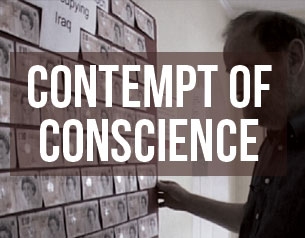Contempt of Conscience
The Peace Tax Seven fight through the courts to redirect 10% of their taxes from military to peaceful uses.
 Can you and I take on the state and win? Should we be able to redirect some of our tax to stop our money from causing bloodshed? 'Contempt of Conscience' explores the idea that each of us is being conscripted to kill through our taxes. Filmed over five years, we follow The Peace Tax Seven as they fight through the courts to redirect 10% of their taxes from military to peaceful uses. The doc combines striking visual archive with the David and Goliath struggle of the Peace Tax Seven.
Can you and I take on the state and win? Should we be able to redirect some of our tax to stop our money from causing bloodshed? 'Contempt of Conscience' explores the idea that each of us is being conscripted to kill through our taxes. Filmed over five years, we follow The Peace Tax Seven as they fight through the courts to redirect 10% of their taxes from military to peaceful uses. The doc combines striking visual archive with the David and Goliath struggle of the Peace Tax Seven.
It's three weeks since the War against Iraq started and Joe Jenkins has decided to fight his own war against the tax system. Jenkins believes that by allowing some of his tax payments to go to the military, he is indirectly accountable for their activities and the results. He takes his tax bill to the Inland Revenue and asks to redirect his 10% military tax, to go to peaceful purposes. "I believe that in the case of war and deliberate killing, I have the right to determine how my taxes are spent and by withholding 10% of my taxes, I'm exercising that right."
After being threatened with imprisonment for withholding £750, the Judge decides to issue a warrant for bailiffs to seize his goods. But when the amount escalates to over £1700, Jenkins feels cornered. "I've got a young family to support, and I decided I had no option but to pay up. So, I suppose I've been conscripted into this war like the rest of the British taxpayers."
Jenkins realises he can't fight this alone. He contacts the Peace Tax Campaign, with over 2,000 members across Britain, supported by 60 MPs. Through this group, Jenkins gets in touch with Robin Brookes, who's also withheld part of his tax money. He's "pinned the £750 he's withholding in £10 notes on a notice board for the bailiffs to unpick". He explains, "you can see what it says, 'every ten seconds Britain spends this much occupying Iraq'.
Jenkins, Brookes and five others meet in Birmingham and form The Peace Tax Seven. They plan to take the case forward for a change in the law. To do this they need to raise £50,000. It sounds like a lot, but with the British Government raising £5.5billion to fight this war, they feel "If peace-building's a costly business, it's nowhere near as costly as war."
In Summer 2005, a year after forming The Peace Tax Seven and with the £50,000 they need, the campaign is gaining momentum. The High Court grants permission to have the case heard. Unfortunately their appeal is turned down. But there is sign of hope when they are granted another appeal and the judges announce previous rulings are legally unsound. After going through the British courts, the courts ruled that "this is not something for us to judge, this is something for Europe to judge," so they proceed to the European Court of Human Rights in Strasbourg. "We've been campaigning and fundraising for four years and we'll be campaigning and fundraising for a while longer." Strong characters and a powerful, clever narrative.
FULL SYNOPSIS
In Summer 2005, a year after forming The Peace Tax Seven and with the £50,000 they need, the campaign is gaining momentum. The High Court grants permission to have the case heard. Unfortunately their appeal is turned down. But there is sign of hope when they are granted another appeal and the judges announce previous rulings are legally unsound. After going through the British courts, the courts ruled that "this is not something for us to judge, this is something for Europe to judge," so they proceed to the European Court of Human Rights in Strasbourg. "We've been campaigning and fundraising for four years and we'll be campaigning and fundraising for a while longer." Strong characters and a powerful, clever narrative.
